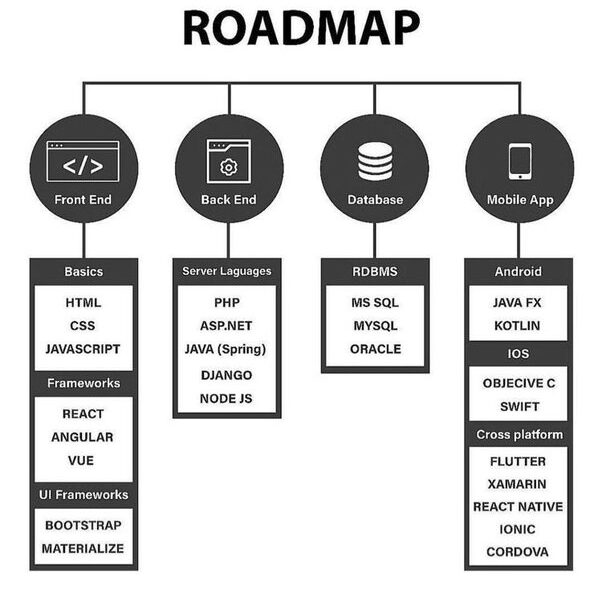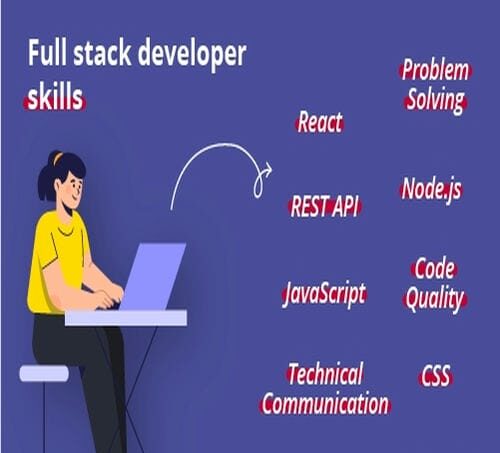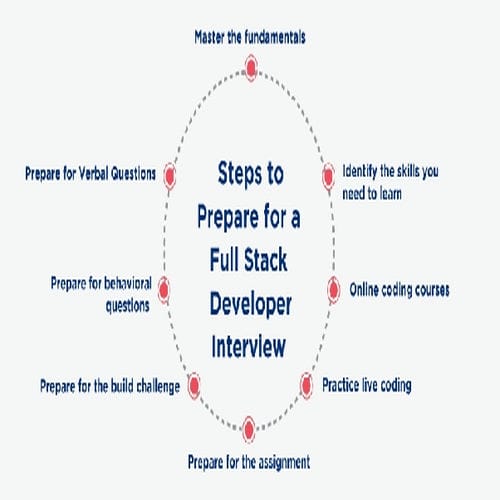Are you ready to dive into the exciting world of full stack development? Are you craze to know how to prepare for full stack developer? Whether you’re a coding enthusiast exploring new career paths or a seasoned developer looking to expand your skill set, preparing for a career as a full stack developer can open up a world of opportunities.
In this comprehensive guide, we’ll walk you through everything you need to know to embark on your journey towards becoming a proficient full stack developer.
But it’s not just about technical prowess – we’ll also discuss the importance of building a strong portfolio, networking within the developer community, and conquering those all-important job interviews.
Whether you’re passionate about crafting beautiful user interfaces or optimising database performance, there’s never been a better time to join the ranks of versatile full stack developers. Let’s dive in!
How to Prepare for Full Stack Developer?
1. What Exactly is a Full Stack Developer?
So, you’ve heard the term “full stack developer“, but what does it really mean? Well, frontend developers are designing the beautiful interface of the website, and backend developers are the engineers working diligently behind the scenes to ensure everything runs smoothly, then full stack developers are those who can do both.
They’re proficient in both frontend and backend technologies, capable of building entire web applications from start to finish.From mastering frontend technologies like HTML, CSS, and JavaScript to delving into server-side programming languages such as Node.js and Python, we’ll cover all the essential skills you’ll need to succeed in this dynamic field.
2. Understanding Web Development
As a full stack developer, you’ll be proficient in both frontend and backend. You might be crafting sleek user interfaces using HTML, CSS, and JavaScript, while the next, you could be designing powerful server-side APIs and databases. It’s a role that requires adaptability, creativity, and a willingness to constantly learn and evolve.
3. Why Being a Full Stack Developer Rocks?
Sure, specialising in frontend or backend development has its perks, but being a full stack developer? You’ll have the freedom to work on a variety of projects, from small-scale websites to complex web applications, and you’ll be able to see the entire development process through from start to finish.
Plus, with the demand for full stack developers on the rise, you’ll never be short of exciting opportunities to showcase your skills and make a real impact in the tech industry.
So, if you’re ready to embark on a thrilling journey that combines creativity, problem-solving, and endless possibilities, so becoming a full stack developer might just be the best decision you ever make. Let’s explore what it takes to thrive in this multifaceted role.

Essential Skills for Full Stack Developers
1. Mastering HTML, CSS, and JavaScript
To excel as a full stack developer, you’ll need to be fluent in the trifecta of frontend technologies: HTML, CSS, and JavaScript. HTML provides the structure, CSS adds the style and flair, and JavaScript brings interactivity and functionality.
2. Tackling Server-Side Programming and Databases
On the backend, you’ll delve into the realm of server-side programming languages and databases. Whether you’re organising data with Node.js, Python, or Ruby, or designing efficient databases using SQL or NoSQL, backend development is where the magic happens behind the scenes.
3. Version Control
With Git, you’ll learn how to track changes, collaborate seamlessly with teammates, and roll back to previous versions with ease. It’s like having a safety net for your code, ensuring that you can always revert back to a stable state no matter how many twists and turns your development journey takes.
4. DevOps and Deployment
You’ll need to navigate the wild world of DevOps and deployment. From containerization with Docker to continuous integration and deployment (CI/CD) pipelines, you’ll learn how to automate the deployment process and ensure that your applications are ready for prime time.
It’s going to be an exhilarating journey filled with challenges, triumphs, and endless opportunities to showcase your skills.
Learning Path for Aspiring Full Stack Developers
1. Self-Study Resources
Are you a self-starter who loves to learn at your own pace? Dive into a treasure trove of online tutorials, courses, and documentation to kickstart your full stack journey.
There are a number of platforms that offer a wealth of resources covering everything from frontend fundamentals to advanced backend techniques. With a bit of curiosity and determination, you’ll be amazed at how much you can accomplish on your own.
2. Bootcamps and Coding Schools
Consider enrolling in a coding bootcamp or coding school specializing in full stack development. These immersive programs offer hands-on training, mentorship from industry experts, and a supportive community of fellow learners.
Plus, many bootcamps boast impressive job placement rates, giving you a clear path to landing your dream job as a full stack developer in record time.
3. Academic Degrees
For those seeking a more comprehensive education, pursuing a degree in computer science or a related field can provide a solid foundation for your full stack career. Worldwide universities provide courses designed for those who want to become developers, covering everything from algorithms and data structures to web development and software engineering.
While earning a degree may require a longer time commitment, the depth of knowledge and credentials you’ll gain can open doors to a wide range of opportunities in the tech industry.
4. Crafting a Diverse Skill Set
No matter which learning path you choose, remember that becoming a proficient full stack developer is about more than just mastering technical skills. Take advantage of any opportunity to extend your knowledge and abilities, improving your project management skills, or delving into the complexities of user experience (UX) design.
By developing a diversified skill set, you’ll become a more well-rounded developer and stand out in a crowded job market. Whether you like to learn on your own, attend a bootcamp, or go the traditional route with a degree, success in full stack development awaits.

Building a Strong Portfolio
1. Showcase Your Skills
Your projects are your chance to shine, demonstrating your technical prowess, creativity, and problem-solving abilities to potential employers.
Whether it’s a sleek e-commerce website, a dynamic social media application, or a handy productivity tool, each project in your portfolio tells a story about who you are as a developer and what you’re capable of achieving.
2. Quality Over Quantity
When it comes to portfolio projects, it’s not about quantity – it’s about quality. Select a handful of projects that showcase a diverse range of skills and technologies, ensuring each one is polished, functional, and visually appealing.
Remember, your portfolio is a reflection of your best work. So, make sure to improve and polish each project until they stand out brilliantly.
3. Continuous Improvement
Building a solid portfolio is a continuous process. It’s an ongoing journey of growth and improvement. As you gain new skills and tackle new challenges, continue to update and expand your portfolio with fresh projects that push the boundaries of your capabilities.
Whether you’re adding new features to existing projects or taking up completely new projects, each addition to your portfolio is an opportunity to showcase your evolution as a developer and solidify your place in the competitive world of full stack development.
With a strategic approach to project selection, a commitment to quality craftsmanship, and a mindset of continuous improvement, you’ll soon have a portfolio that wows recruiters and sets you apart from the crowd.
Networking and Community Involvement
1. Join the Developer Community
In the vibrant world of developer communities, where like-minded individuals come together to share knowledge, collaborate on projects, and support one another on their coding journeys.
Whether you’re a seasoned pro or just starting out, joining a developer community is one of the best ways to expand your network, stay up-to-date with industry trends, and find inspiration for your next project.
2. Attend Meetups and Conferences
Looking to take your networking efforts offline? Attend local meetups, conferences, and hackathons to connect with fellow developers, industry experts, and potential employers in person.
These events offer invaluable opportunities to exchange ideas, learn from others, and create meaningful connections that can propel your career forward.
3. Harness the Power of Social Media
In today’s digital age, social media platforms like Twitter, LinkedIn, and GitHub are like a digital hangout where developers come together to work together and help each other out. Follow influential figures in the tech industry, participate in relevant discussions, and showcase your own projects to attract attention and build credibility within the developer community.
4. Build Relationships
Networking isn’t just about collecting business cards or LinkedIn connections. It’s about building genuine relationships with people who share your passion for technology. Be authentic, be curious, and be generous with your knowledge and expertise.
By investing in meaningful connections and building your network gradually, you’ll not only expand your opportunities but also find contentment in the community of developers who share a common bond.
Whether you’re socializing at a local gathering, engaging with fellow developers on social media, or collaborating on projects within online communities, networking is the secret place that can take your career to new heights.
Interview Preparation
1. Cracking the Code
Whether you’re facing a technical assessment, a behavioural interview, or a coding challenge, preparation is key to success. Let’s break down what to expect and how to ace each stage of the interview process.
2. Technical Know-How
Refresh your knowledge of algorithms, data structures, and problem-solving techniques. You never know when you’ll be asked to whiteboard a solution or tackle a coding challenge. Practice coding exercises, review common interview questions, and familiarize yourself with the technologies and frameworks relevant to the position you’re applying for.
The more confident and prepared you feel, the better equipped you’ll be to tackle any technical challenges that come your way.
3. Showcasing Your Experience
Be ready to share examples of projects you’ve worked on, challenges you’ve overcome, and lessons you’ve learned along the way. Highlight your ability to collaborate with teammates, communicate effectively, and adapt to changing priorities.
After all, being a full stack developer is about more than just writing code; it’s about solving problems and delivering value to stakeholders.
4. Stay Calm and Confident
Take a deep breath, stay focused, and approach each question with confidence and clarity. Be honest about what you know and don’t know, and don’t be afraid to ask questions or seek clarification if something isn’t clear.
The interview is as much an opportunity for you to learn about the company and the role as it is for them to learn about you. So, relax, be yourself, and let your passion for full stack development shine through – you’ve worked hard to get here, and now it’s time to show the world what you’re made of.

Continuous Learning and Growth
1. The Power of Intellectual Curiosity
As a full stack developer, there’s always something new to discover – whether it’s a cool tech, a neat coding trick, or a fresh design idea. Making a mindset of intellectual curiosity, seeking out opportunities to expand your knowledge and explore new horizons.
Whether it’s attending workshops, reading industry blogs, or enrolling in online courses, never stop feeding your hunger for learning.
2. The Importance of Practice and Reinforcement
Set aside time each day to code, experiment with new technologies, and work on passion projects that push the boundaries of your skills. By consistently challenging yourself and reinforcing what you’ve learned, you’ll not only become a better developer but also position yourself for success in the long run.
3. Utilizing the Power of Peer Learning
Learn on your fellow developers for support, guidance, and inspiration. Whether it’s joining online forums, participating in coding challenges, or attending local meetups, surrounding yourself with a community of like-minded individuals can provide invaluable opportunities for learning, collaboration, and growth.
Conclusion
In conclusion, preparing for a career as a full stack developer is an exciting journey filled with opportunities for growth, learning, and innovation. By mastering essential skills, building a strong portfolio, networking within the developer community, and acing interviews, you’ll be well-equipped to embark on a fulfilling career in this dynamic field.
However, the learning doesn’t stop once you’ve landed the job – continuous learning and growth are essential for staying ahead in the ever-evolving tech industry.
Visit Devtrain.co today to access a wealth of resources, courses, and community support to help you thrive as a full stack developer.



www.xmc.pl
Reading this felt like watching the sunrise over a calm sea — filled with quiet awe and deep appreciation.
chickenroad
Chicken Road gamehttps://apkpure.com/p/app.chickenroad.game
free binance account
I don’t think the title of your article matches the content lol. Just kidding, mainly because I had some doubts after reading the article.